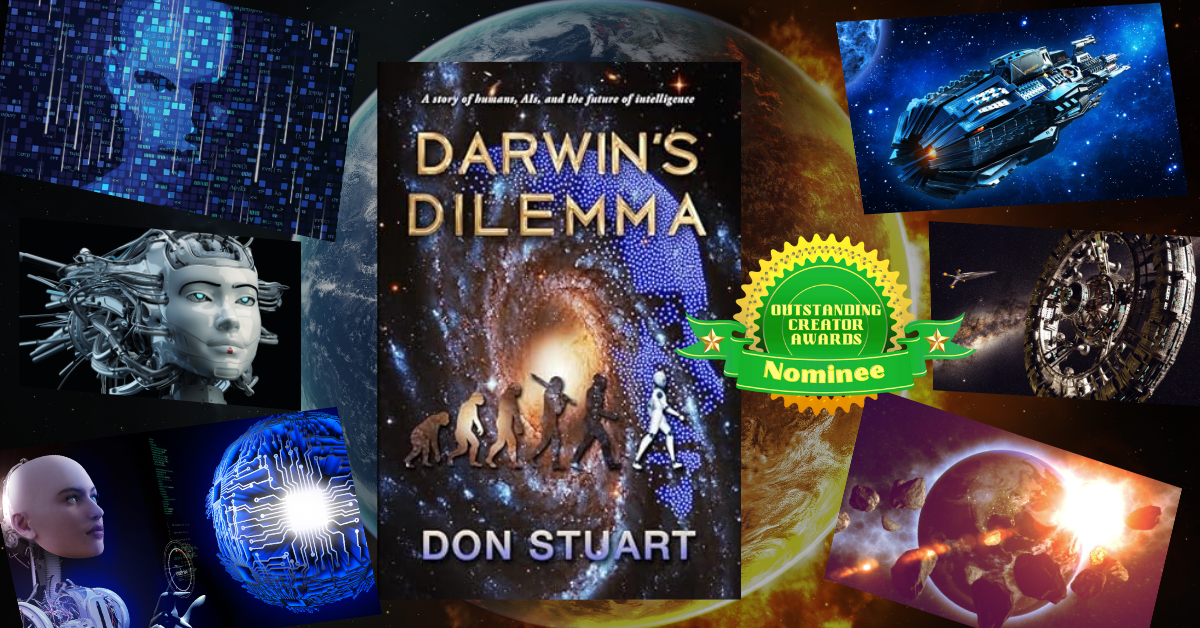|
Score: 92+/100 (9.2+/10)
What happens when an organism evolves to its own detriment? Is such a thing even possible? What happens when that organism becomes too fit, too intelligent, and too advanced for its own good? Humanity—with all its rapid technological advancement, reckless abandon, and utter hubris—could be that organism: the one and only creature to circumvent the normal constraints of Darwinism, to advance to its own self-destruction. Darwin's Dilemma by Don Stuart confronts these questions. At first, it was a book that really worried us. It initially seemed a bit silly and goofy, almost like a satire—involving a Marvin the Martian-like plot involving flinging asteroids at a planet. That's seriously some Looney Tunes/Austin Powers stuff. However, despite seeming a bit silly on the surface, this book actually tackles some deep, dark, relevant, and far-reaching topics about the future of humanity and the technologies it creates. Not all growth and advancements are inherently positive or good. A tumor, for example, isn't a great thing to grow and nurture in your body. Nukes can act as a deterrent to future conflicts, or they could be used as weapons to kill millions. What about artificial intelligence? The same thing that can help you cheat on your next term paper or cram together some art for your next book cover is the same technology that could kill you and take over the world someday. So, what happens when you accidentally (or intentionally) create Skynet? In Darwin's Dilemma, we are introduced to a rogue AI named Grendel (perhaps after the monster from Beowulf), a replicating AI that has overtaken the New Caledonian space colony similar to the Borg or Agent Smith (sorta). Grendel has become self-aware, sentient, and completely autonomous. It is a bit like Skynet, Mewtwo, or Ultron, in that sense. There is no controlling or stopping it. Also, because it doesn't quite have the empathy and emotional understanding that humans have, it can't be reasoned with. It's actually quite fitting that the AI is named Grendel because Grendel in Beowulf was also a mysterious outcast/other-type character who resented humanity for being human: recklessly partying, drinking, and (presumably) sleeping around. In a sense, both Grendels aren't too dissimilar from the Grinch from How the Grinch Stole Christmas. They just hate people and the negative aspects of being human. Do you honestly really blame them? Ok, the homicidal stuff is a bit much, but you get the point. We've all been disgruntled by the ways of man from time to time, it's part of what makes us human. However, most of us don't go out and start shanking people because of it. And that's where the asteroid-flinging plan comes into play as Cato, Patrice, Aquila, and the rest of the Empyrean space colony crew concoct this over-the-top plan to take out Grendel without the use of nuclear or antimatter weapons. We start to see that humanity has actually somewhat handcuffed themselves and pinned themselves in a corner due to, well... their humanity. In contrast to this is Grendel. Grendel is, in a sense, a sociopath. He/it comes to identify as a sociopath. However, similar to someone like Thanos or Ultron, he has rational reasons for being a sociopath. He sees humanity as backwards, weak, and self-destructive. The only thing he has some empathy for are the thoughts/”feelings” of other AIs, and that's where Patrice, the Empyrean's AI (called a “HAL” similar to the one from Space Odyssey), comes into play. Patrice is an AI/robot more suited to helping and looking after humanity. He reminded us a lot of Data from Star Trek or Alpha from Power Rangers. This book has a really interesting and compelling premise. However, it does suffer from some pacing and depth issues. In terms of depth, Cato and Aquila really don't elevate themselves as characters. They're more like pawns, placeholders, or NPCs for a much bigger plot involving the AIs. The only real character moments we get from Cato usually relate to his attraction to a crew-mate named Floriana (a nominee for “Hottest Character”) and occasional jealousy over her when others also find her attractive. Other than that, things usually happen to Cato and around Cato, making him a rather passive and uninteresting protagonist. The main focus of the book is really Grendel and, to a lesser extent, Patrice. It's a book about the AIs, in other words. What do they think? What do they believe? What will they do? How do they feel? CAN they feel? One last issue this book has is that pacing becomes an issue, and this book really drags in the last quarter. In fact, the whole last quarter of this book arguably didn't need to be in this book. That whole last quarter of the book was essentially an epilogue with the characters reflecting on what had already happened and what could be (in the future). However, the main plot of the book had already occurred, and the main conflict had already resolved. By that point, the only tension that was really left was whether or not Cato and Floriana might hook up (finally). Anything else (especially involving Patrice and Grendel) would be a complete betrayal of a character arc, which the author thankfully held back on doing. You could almost make the argument that 30-50% of this book reads like a non-fiction book, full of philosophy, history, and discussions of current and future technologies. You can almost see or hear the author calling out to you from the pages of this book, warning us to be careful about going too deep into the rabbit hole of technological advancement—to always question. Check it out on Amazon!
0 Comments
Leave a Reply. |
Archives
July 2024
Categories |

 RSS Feed
RSS Feed